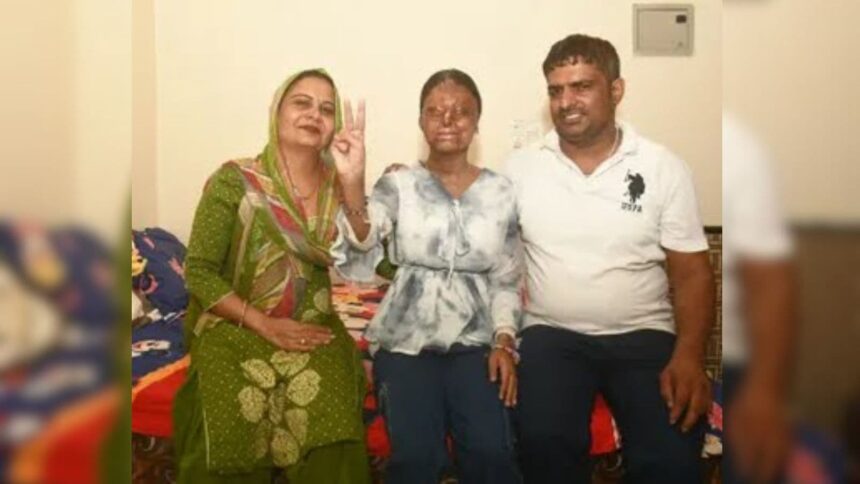Seated with a gentle smile and unwavering confidence in a one-room apartment in Chandigarh is 17-year-old Kafi, a young woman whose story is a testament to the power of resilience and hard work.
At just three years, Kafi’s life changed forever when an acid attack by a neighbour left her visually challenged and her face disfigured. Fourteen years later, she stands tall as the topper at the Institute for the Blind in , securing 95.6% in Class 12 board exams.
“I never imagined that one day, despite all odds, my daughter would bring such pride and recognition to our family. I’m so proud of her,” says her father, Pawan Kumar, tears welling up in his eyes.
The attack happned on Holi on 2011. “Kafi was left just a piece of flesh. We could barely identify her organs. She lost her eyesight completely, and her facial features were severely damaged,” says her father.
What followed was years of pain and hospital visits. “The next six years were a nightmare. We spent most of our time at AIIMS, , for her surgeries. We wondered if she would survive a month or two. Her wounds took more than four years to nurse. People used to say, “How long will you care for her?” says Kumar.
Kafi still struggles with physical consequences, and visits to hospitals are frequent. “As I grow, my skin, especially around my neck and throat, becomes tighter due to scars. My facial skin is very sensitive. I can’t step out in direct sunlight,” she says.
She talks about the limitations most people don’t think about twice. “It’s disheartening when I realise I can’t go shopping like others. I can’t see what I’m wearing. I wish I could look in the mirror and see myself the way others do.”
But it’s not just the physical struggle that lingers. “Children scream when they see me for the first time. Co-passengers stare with disgust. Some even ask me to cover my face. That hurts more than the physical scars,” Kafi says. “But it only fuels my resolve to study hard, succeed, and lift my father out of poverty.”
With no visual memories from her childhood and limited financial resources, Kafi turned to resources within her reach. A smartphone and audiobooks became her teacher. “I listen to podcasts about success and positivity, follow cricket commentary, stay updated on current affairs, and focus on my studies. It helps me block out negativity. For a visually impaired person, it’s a blessing in disguise, no distractions,” she says.
She also enjoys watching the sport that unites India — cricket. “I listen to the commentary on my phone and discuss every detail with my younger brother. I love the game because of . I admire him a lot,” she says with enthusiasm.
Asked how she envisions her favourite player, Kafi responds, “I can’t picture anyone visually, but I know him as the fittest guy, with an impeccable personality and amazing consistency. I admire how he balances personal and professional life.”
Like millions of fans, Kafi too was heartbroken when Kohli announced his retirement from Test cricket. “I was so disappointed. He’s just 36. Legends like retired from Tests only after leaving other formats. My mood only lifted the next day when my came,” she laughs.
Despite her admiration, Kafi doesn’t want pity. “I want to meet Kohli only after I achieve something. I don’t want anyone to meet me out of sympathy,” she says with conviction.
Behind Kafi’s resilience is the father who worked hard to see his daughter succeed. After the attack, Kumar left his ancestral home in Haryana’s Hisar, sold his property, and relocated to Chandigarh to give Kafi a chance at a better life.
In Chandigarh, struggles continued — from job hunting and securing school admission for Kafi to fighting a prolonged legal battle. Kumar says he even took up work as a sweeper. “People mocked me. But I had no choice. I cleaned toilets for two years to give my daughter a chance to live.”
Today, Kumar works as a contractual peon at the Mini Secretariat in Chandigarh and drives an auto-rickshaw at night.
“Having seen my two elder sisters suffer in their marriages, I feared having a daughter. And when she was born, I prayed to God: ‘ Bhagwan, yeh ek hi kaafi hai’ (God, one daughter is enough). I didn’t want her to suffer like my sisters did. So, I named her Kafi,” says Kumar, on how her daughter got her name. “But the day I realised my daughter is a blessing and a fighter, I decided I’ll do whatever it takes to support her.” It’s my remorse for once wishing: Ek hi Kafi hai.”
Meanwhile, for Kafi, no dream is too big. She plans to study Political Science at Delhi University and dreams of becoming an IAS officer. “I will work harder to reach that position, and I want to get posted in the same office where my father works as a peon,” she says.








